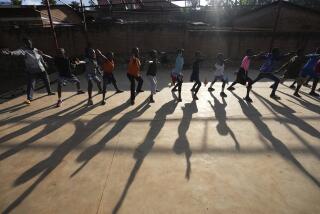An Excessive Wait for Justice
- Share via
In the slow march of justice, the innocents of Rwanda and Bosnia share a common plight. U.N. war crimes tribunals have barely begun their task of trying those accused of genocidal abuses that made the names of the two countries synonymous with horror.
December saw the start of the first trial of a Hutu man facing a murder charge that stems from the genocidal killings of an estimated 1 million members of the Tutsi minority in 1994. The delay was attributed in part to administrative problems. Few of the 85,000 jailed Hutus are expected to incriminate themselves or others; they face execution if convicted.
In Bosnia’s case, trials have been underway in The Hague since early last year, but the defendants are considered small fry among the Bosnian Serb and Croatian soldiers accused of the war’s grossest human rights abuses. Radovan Karadzic and Ratko Mladic, the Bosnian Serbs’ political and military leaders during the war, remain free, brazenly so.
Would a permanent world court for war crimes prove more effective? The United Nations has agreed in principle to explore the idea in a 1998 conference. That will be a long wait, too long for effective justice in Rwanda and Bosnia.
More to Read
Sign up for Essential California
The most important California stories and recommendations in your inbox every morning.
You may occasionally receive promotional content from the Los Angeles Times.










